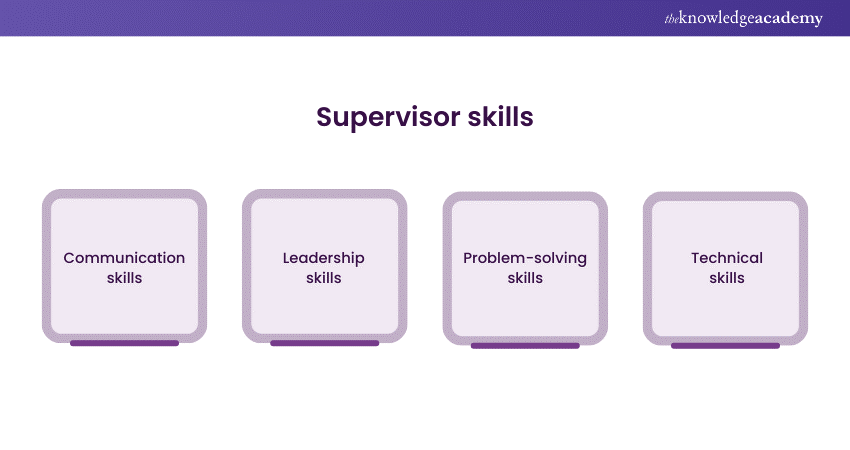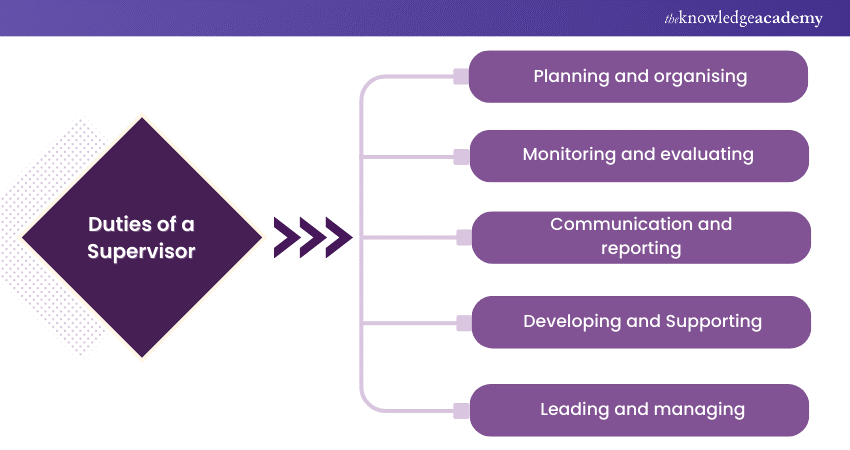We may not have the course you’re looking for. If you enquire or give us a call on +44 1344 203999 and speak to our training experts, we may still be able to help with your training requirements.
We ensure quality, budget-alignment, and timely delivery by our expert instructors.

Becoming a Supervisor is not easy, but it can be rewarding and fulfilling. Supervisors are responsible for managing teams, ensuring quality and productivity, and communicating with upper management. Supervisors also have the chance to mentor and coach their employees and help them grow professionally. But How to Become a Supervisor? What skills and qualifications do you need? And what are the benefits of being a Supervisor? In this blog, we will answer these questions and more and provide you with a step-by-step guide on How to Become a Supervisor.
Table of contents
1) Steps to Become a Supervisor
a) Explore Supervisor education requirements
b) Start to develop specific Supervisor skills
c) Complete relevant Supervisor training and internships
d) Gain additional Supervisor certifications
e) Research Supervisor duties and responsibilities
f) Prepare your Supervisor resume
g) Apply for Supervisor jobs
2) Conclusion
Steps to Become a Supervisor
There is no one-size-fits-all formula for becoming a Supervisor, as different industries and organisations may have different requirements and expectations. However, there are some common steps that you can follow to prepare yourself for this role. Here are some of them:
1) Explore Supervisor education requirements
The first step to becoming a Supervisor is to research the specific skills and knowledge that you need for your desired industry and position. This research often involves understanding the key Functions of a Supervisor. You can do this by reading job descriptions, talking to current Supervisors, or consulting with industry experts. Some of the general skills that most Supervisors need are:

a) Communication skills: Supervisors need to communicate effectively with their employees, peers, and managers, using both verbal and written methods. They also need to listen actively, give constructive feedback, and resolve conflicts.
b) Leadership skills: Supervisors need to motivate and inspire their teams, set clear goals and expectations, delegate tasks, and monitor performance. They also need to demonstrate integrity, accountability, and professionalism.
c) Problem-solving skills: Supervisors need to identify and analyse problems, generate and evaluate solutions, and implement them in a timely and efficient manner. They also need to be adaptable and flexible and cope with changes and challenges.
d) Technical skills: Supervisors need to have a solid understanding of the technical aspects of their work, such as the tools, processes, and standards that they use. They also need to keep up with the latest trends and developments in their field and learn new skills as needed.
2) Start to develop specific Supervisor skills
Once you have identified the skills and knowledge that you need to become a Supervisor, you need to work on improving them. You can do this by taking courses, watching videos, reading books or attending workshops and seminars.
You can also seek feedback from your managers, mentors, or colleagues' mentors and ask them for advice and suggestions. You can also practice your skills by taking on more responsibilities, leading projects, or volunteering for initiatives that require Supervisory skills.
3) Complete relevant Supervisor training and internships
Another way to prepare yourself for becoming a Supervisor is to gain some practical experience through training or an internship. It will allow you to apply your skills and knowledge in a real work environment and learn from experienced Supervisors.
You can look for opportunities within your current organisation or outside of it, depending on your goals and availability. You can also ask your manager or mentor for recommendations or referrals.
4) Gain additional Supervisor certifications
Depending on your industry and position, you may need to obtain some certifications to become a Supervisor. Earning certifications can showcase your proficiency and reliability, thereby enhancing your prospects of securing employment or advancing in your career. Some of the common certifications for Supervisors are:
a) Certified Professional in Learning and Performance (CPLP): Offered by the Association for Talent Development, this credential recognises expertise in creating, implementing, and assessing learning and performance strategies.
b) Certified Manager (CM): Provided by the Institute of Certified Professional Managers, this certification focuses on essential managerial skills, including planning, organising, leadership, and control.
c) Certified Supervisor (CS): This certification is offered by the National Association of Workforce Development Professionals (NAWDP), and it focuses on the skills and knowledge related to workforce development, such as coaching, mentoring, and performance management.
5) Research Supervisor duties and responsibilities
Before you apply for a Supervisor position, you need to understand the responsibilities and expectations that come with it. Supervisors have a lot of duties and functions, such as:

a) Planning and organising: Supervisors need to plan and organise the work of their teams, such as setting goals, assigning tasks, allocating resources, and scheduling activities.
b) Monitoring and evaluating: Supervisors need to monitor and evaluate the work of their teams, such as tracking progress, measuring results, providing feedback, and taking corrective actions.
c) Communicating and reporting: Supervisors need to communicate and report the work of their teams, such as updating managers, informing stakeholders, and documenting outcomes.
d) Developing and supporting: Supervisors need to develop and support their teams, such as training, coaching, mentoring, and motivating them.
e) Leading and managing: Supervisors need to lead and manage their teams, such as creating a positive work environment, resolving conflicts, enforcing policies, and making decisions.
Maximise your productivity and reclaim your time – register for our Time Management Training now to boost your efficiency and achieve your goals!
6) Prepare your Supervisor resume
Once you have acquired the skills, knowledge, experience, and certifications you need to become a Supervisor, you must create your resume. Your resume is a marketing tool, and it should highlight your qualifications and achievements as a Supervisor. Some of the tips for creating a resume are:
a) Use a clear and professional format, and include your contact information, summary, skills, work experience, education, and certifications.
b) Use keywords that match the job description and emphasise your Supervisory skills and accomplishments.
c) Use points to describe your work experience and quantify your results with numbers and metrics.
d) Proofread and edit your resume, and check for spelling, grammar, and punctuation errors.
7) Apply for Supervisor jobs
The final step to becoming a Supervisor is to start applying for relevant positions. You can use various methods to find and apply for jobs, such as:
a) Networking: You can use your personal and professional contacts, such as friends, family, colleagues, managers, mentors, or alumni, to find out about job openings, referrals, or recommendations.
b) Online job boards: You can use job search engines, which are available online for job postings, upload your resume, and apply online.
c) Company websites: You can visit the companies' websites that interest you and check their career pages, where they may post job openings, requirements, application procedures, and even helpful resources like Supervisor Interview Questions to better prepare for the hiring process.
d) Recruitment agencies: You can use recruitment agencies to help you find and apply for jobs, as they may have access to exclusive job opportunities and provide you with guidance and support.
Unlock your full potential and embark on a journey of personal growth with our transformative Personal Development Training – invest in yourself today.
What are the duties and functions of a Supervisor?
As we have seen in the previous section, supervisors have a lot of duties and functions, which can vary depending on the industry, organisation, and position. However, when comparing Superintendent vs Supervisor, it's important to understand the distinct roles each position plays. Some of the common duties and functions of a supervisor are:
a) Supervising the work of employees and ensuring that they follow the rules, regulations, and standards of the organisation.
b) Providing feedback, recognition, and rewards to employees and addressing any issues, concerns, or complaints that they may have.
c) Training, coaching, mentoring, and motivating employees, and helping them develop their skills, knowledge, and performance.
d) Evaluating the performance of employees and conducting appraisals, reviews, and assessments.
e) Hiring, firing, promoting, or disciplining employees, and handling any employee relations matters.
f) Communicate with management and report on the status, progress, and results of the team's work.
g) Collaborating with other Supervisors and managers, and departments, and coordinating the work of the team with other teams or units.
h) Solving problems, making decisions, implementing solutions, and dealing with any challenges or changes that may arise.
i) Planning and organising the work and setting goals, objectives, and priorities.
j) Allocating and managing the resources of the team, such as budget, time, equipment, and materials.
Enhance your organisational skills for a more efficient and successful career – register for our Organisational Skills Course today!
Advantages of pursuing a career as a Supervisor
Becoming a Supervisor can have many advantages, both personally and professionally. Some of the advantages of pursuing a career as a Supervisor are:
a) You can work on your leadership skills and learn how to manage people, projects, and processes.
b) You can advance your career and have more opportunities for growth, promotion, and recognition.
c) You can increase your income and earn more money, benefits, and incentives.
d) You can have more autonomy, control, and influence over your work and your team.
e) You can have more impact and make a difference in your organisation, your industry, and your society.
f) You can have more satisfaction and enjoy your work more as you help your team and your organisation achieve their goals and vision.
Conclusion
Becoming a Supervisor is a challenging but rewarding career path that can offer you many benefits and opportunities. Understanding the difference between Team Leader and Supervisorr is crucial as it can guide you in defining your role and responsibilities. However, it also requires a lot of preparation, skills, knowledge, and experience. In this blog, we have provided you with a step-by-step guide on How to Become a Supervisor, the duties and functions of a Supervisor, and the advantages of pursuing this career path. For those preparing for the role, reviewing Supervisor Interview Questions and Answers can help you understand the key responsibilities and expectations, ensuring you’re ready for a successful interview.
Ready to supercharge your leadership potential? Register for our Supervisory Training now and become the effective Supervisor your team deserves!
Frequently Asked Questions
What are the skills that a Supervisor needs?

A Supervisor needs various skills, such as communication, leadership, problem-solving, technical, and interpersonal skills. These skills help a Supervisor to manage their team, ensure quality and productivity, and communicate with upper management.
How can I get feedback on my Supervisory skills?

You can get feedback on your Supervisory skills by asking your colleagues, managers, or mentors for their opinions and suggestions. You can also use self-assessment tools like online quizzes, surveys, or tests to evaluate your strengths and weaknesses.
What are the challenges of being a Supervisor?

Being a Supervisor can be challenging, as you may face situations such as dealing with difficult employees, handling conflicts, coping with stress, meeting deadlines, and balancing multiple tasks. To overcome these challenges, you must be adaptable, resilient, and resourceful and seek support from your peers, managers, or mentors.
What are the other resources and offers provided by The Knowledge Academy?

The Knowledge Academy takes global learning to new heights, offering over 3,000 online courses across 490+ locations in 190+ countries. This expansive reach ensures accessibility and convenience for learners worldwide.
Alongside our diverse Online Course Catalogue, encompassing 19 major categories, we go the extra mile by providing a plethora of free educational Online Resources like News updates, Blogs, videos, webinars, and interview questions. Tailoring learning experiences further, professionals can maximise value with customisable Course Bundles of TKA.
What are related Leadership courses and blogs provided by The Knowledge Academy?

The Knowledge Academy offers various Leadership Training, including Leadership skills training, Business administration, and Agile leadership training. These courses cater to different skill levels, providing comprehensive insights into Leadership methodologies.
Our Business Skills blogs cover a range of topics related to PRINCE2, offering valuable resources, best practices, and industry insights. Whether you are a beginner or looking to advance your Project Management skills, The Knowledge Academy's diverse courses and informative blogs have covered you.
What is The Knowledge Academy's FlexiPass, and how can clients access this flexible training option?

The Knowledge Academy’s FlexiPass is a pre-paid training voucher that is built specifically for clients and their dynamic needs. It provides access to a wide range of courses, at a pre-determined price, with robust safety measures. FlexiPass gives clients the added benefit of upskilling on a budget that best fits them.
Upcoming Business Skills Resources Batches & Dates
Date
 Attention Management Training
Attention Management Training
Fri 11th Apr 2025
Fri 13th Jun 2025
Fri 8th Aug 2025
Fri 26th Sep 2025
Fri 21st Nov 2025






 Top Rated Course
Top Rated Course



 If you wish to make any changes to your course, please
If you wish to make any changes to your course, please


